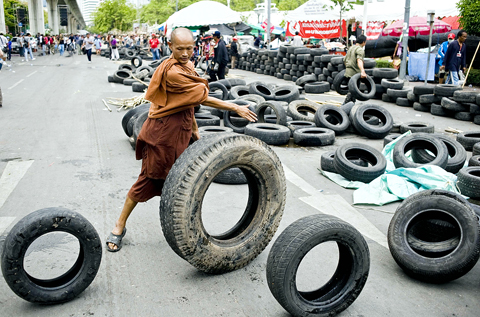Thailand’s prime minister said yesterday that he had no plans to declare martial law despite growing demands the government take firmer measures to end protests that have paralyzed parts of Bangkok for seven weeks.
In a small concession, the demonstrators yesterday shifted their tire barricades away from a hospital on the edge of their encampment in a move intended to allow the medical facility to reopen.
Many Thais have grown increasingly frustrated with the stalemate, which has claimed the lives of at least 27 people, cost the country tens of millions of dollars and sparked concerns of a flare-up of civil unrest.

PHOTO: AFP
In an emergency meeting yesterday, the Cabinet approved special funding for the police to contain the demonstrators. Ahead of the meeting, Thai Prime Minister Abhisit Vejjajiva said the government had a plan for ending the crisis — but he declined to say what it was.
“I insist that the government has a clear approach,” he said in his weekly television address. “All responsibilities rest with me. Every decision has been made. At the moment it’s at the stage of execution for the most successful outcome.”
Abhisit did not elaborate on what those decisions were, though he expressed willingness to make some compromises.
“Those violating the law must cease, whereas the government should not ignore the political demands,” he said.
Abhisit has publicly suspended talks with the protesters but says he still hopes a political solution will persuade the thousands of Red Shirts to abandon the barricaded encampment they have set up in the streets of Bangkok. He has not ruled out a crackdown, which would almost certainly add to the bloodshed.
However, Abhisit said yesterday he was reluctant to give in to demands from a group of pro-establishment protesters who have called for a declaration of martial law.
“So far, from what we have discussed, we [the government and the army] think that the situation doesn’t warrant martial law,” he said.
The Red Shirts said they would ignore any declaration of martial law anyway.
“Even if they announce that, we are not going to go home, we are going to stay put,” said Nattawut Saikua, a Red Shirt leader.
The Red Shirts drew intense criticism last week after raiding Chulalongkorn Hospital on the edge of their protest site, prompting medical officials to evacuate it of patients.
Yesterday, the demonstrators dismantled the barricade blocking access to the hospital and rebuilt it about 45m away. Police then used a crane to assemble a short barrier of concrete blocks in front of the new barricade, effectively fortifying the protest camp.
Nattawut Saikua, a Red Shirt leader, said the raid on the hospital was a mistake.
“[We] have to apologize for what has happened,” he said. “I would like the government to take responsibility for several incidents the same way the protesters did for the Chulalongkorn Hospital case.”
With negotiations between the protesters and the government on hold and hopes for a peaceful end to the standoff dwindling, calls have grown for international mediation.

RESILIENCE: Deepening bilateral cooperation would extend the peace sustained over the 45 years since the Taiwan Relations Act, Greene said Taiwan-US relations are built on deep economic ties and shared values, American Institute in Taiwan (AIT) Director Raymond Greene said yesterday, adding that strengthening supply chain security in critical industries, enhancing societal resilience through cooperation and deepening partnerships are key to ensuring peace and stability for Taiwan in the years ahead. Greene made the remarks at the National Security Youth Forum, organized by National Taiwan University’s National Security and Strategy Studies Institution in Taipei. In his address in Mandarin Chinese, Greene said the Taiwan-US relationship is built on deep economic ties and shared interests, and grows stronger through the enduring friendship between

GAINING STEAM: The scheme initially failed to gather much attention, with only 188 cards issued in its first year, but gained popularity amid the COVID-19 pandemic Applications for the Employment Gold Card have increased in the past few years, with the card having been issued to a total of 13,191 people from 101 countries since its introduction in 2018, the National Development Council (NDC) said yesterday. Those who have received the card have included celebrities, such as former NBA star Dwight Howard and Australian-South Korean cheerleader Dahye Lee, the NDC said. The four-in-one Employment Gold Card combines a work permit, resident visa, Alien Resident Certificate (ARC) and re-entry permit. It was first introduced in February 2018 through the Act Governing Recruitment and Employment of Foreign Professionals (外國專業人才延攬及雇用法),

The Ministry of Transportation and Communications yesterday said that it would redesign the written portion of the driver’s license exam to make it more rigorous. “We hope that the exam can assess drivers’ understanding of traffic rules, particularly those who take the driver’s license test for the first time. In the past, drivers only needed to cram a book of test questions to pass the written exam,” Minister of Transportation and Communications Chen Shih-kai (陳世凱) told a news conference at the Taoyuan Motor Vehicle Office. “In the future, they would not be able to pass the test unless they study traffic regulations

‘COMING MENACINGLY’: The CDC advised wearing a mask when visiting hospitals or long-term care centers, on public transportation and in crowded indoor venues Hospital visits for COVID-19 last week increased by 113 percent to 41,402, the Centers for Disease Control (CDC) said yesterday, as it encouraged people to wear a mask in three public settings to prevent infection. CDC Epidemic Intelligence Center Deputy Director Lee Chia-lin (李佳琳) said weekly hospital visits for COVID-19 have been increasing for seven consecutive weeks, and 102 severe COVID-19 cases and 19 deaths were confirmed last week, both the highest weekly numbers this year. CDC physician Lee Tsung-han (李宗翰) said the youngest person hospitalized due to the disease this year was reported last week, a one-month-old baby, who does not